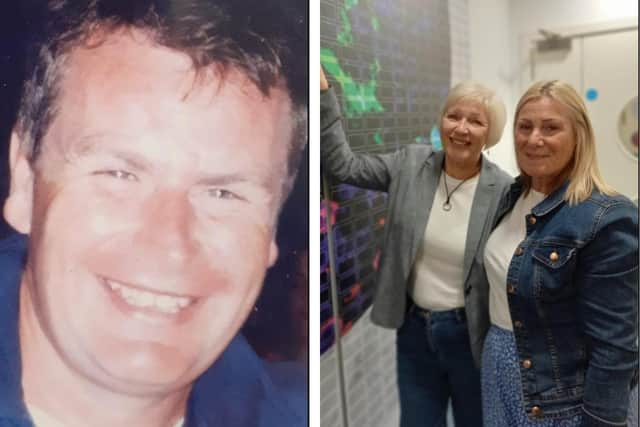Leven woman visits brain tumour centre to lay tiles in memory of partner
and live on Freeview channel 276
Deirdre Cullen, from Lundin Links, was invited to the Brain Tumour Research’s Queen Mary University of London Centre of Excellence. She placed tiles representing the two days of research she funded in memory of her partner of 26 years.
Deirdre and Terry, were on holiday in Gran Canaria in 2019 when issues with walking and eating presented themselves. With Deirdre worried her husband may have suffered a stroke, Terry underwent a CT and MRI scan upon his return to Scotland. The results showed a brain tumour, which experts confirmed looked like a glioblastoma (GBM).
Advertisement
Hide AdAdvertisement
Hide AdDeirdre said: “I couldn’t believe it. Terry was very fit – he ran marathons, cycled and played golf. His job working for the council was pretty physical – looking after football pitches and tending open spaces. It was such a shock to hear that Terry’s survival prognosis was only three months without any intervention, six months if he had a biopsy and chemotherapy and 12 to 18 months if he went for the standard treatment.”


Terry chose surgery, as well as radiotherapy and chemotherapy, but first he decided to put his life in order.
However, with the strong possibility that Terry wouldn’t survive, in the space of two weeks, the couple hurriedly organised their wedding. In addition, they sorted his funeral plan, set up a power of attorney and updated Terry’s will.
Terry underwent a craniotomy on 3 June of that year. With 90% of the tumour removed he was out of bed and discharged within a few days. Doctors warned they could not remove the remaining tumour without paralysing Terry. After the surgery Terry had significant weakness in his left side and he underwent further treatment. Radiotherapy and chemotherapy was followed by inclusion in a clinical trial, however side effects meant he had to stop taking the medication.
Advertisement
Hide AdAdvertisement
Hide AdDuring the early stages of the Covid pandemic, his condition deteriorated. An MRI scan in May 2020 showed that Terry’s tumour was growing again and chemotherapy failed to arrest the tumour. Terry passed away on September 7, 2020.
Deirdre asked for funeral donations to Brain Tumour Research and set up a Much Loved page. Including regular donations from Deirdre on anniversaries and birthdays, more than £6000 has been raised to help find a brain tumour cure – enough to sponsor the equivalent of two days of research.
She added: “It makes me angry that treatments for brain tumour patients have barely changed in decades and research into finding better outcomes and ultimately a cure is so grossly underfunded. It feels poignant that I am visiting the Research Centre at Queen Mary on our wedding anniversary where our fundraising in memory of Terry is making a difference for this dreadful disease which kills more men under the age of 70 than prostate cancer”.
Deirdre, accompanied by her friend Joyce Rodger, was among a select group of supporters given the opportunity to tour the labs at Queen Mary University of London, led by principal investigator Professor Silvia Marino.